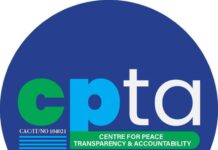Taming Corruption Through Asset Declaration, By Victor Emejuiwe
POLITICS DIGEST – Transparency International recently ranked Nigeria the 146th most corrupt country in the world; this is despite all the efforts put in place by the Federal Government to reduce the scourge of corruption. The Federal Government frowned on the T.I. report accusing it of being biased, but whether the government accepts the report or not, it is so glaring that poor implementation of anti-corruption laws and weak regulatory frameworks are responsible for undermining its efforts in the fight against corruption. There are myriads of laws and regulations against corruption in Nigeria; however, the implementation is ineffective due to the lack of pro-activeness of those who are expected to implement the law or the loopholes in the existing laws. Beyond arrests and prosecution of corrupt offenders, there is a need to channel more efforts in preventing corruption through strengthening of existing laws. For the purpose of this article, one of those laws is the public asset declaration law. The public officers’ asset declaration law is contained in the provisions of the Section 15 (1) of the Code of Conduct Bureau and Code of Conduct Tribunal Act which provide that every public officer shall submit to the Bureau a written declaration of all their properties, assets and liabilities, and those of their spouses or unmarried children under the age of 18 years. The laws also require such officers to update the asset declaration forms after every four years while in office and also declare their assets after leaving office. Based on the provisions of the Act, if an officer is discovered to have provided wrong information in their asset declaration, such an officer has committed an offence punishable by law.
Read Also:
This law covers all public servants in the Ministries, Departments and Agencies, including military and paramilitary and the legislative arm of government. However, like every other anti-corruption law in Nigeria, the provisions of asset declaration are not strictly enforced. First, the law makes it difficult for the public to access information on assets declared by public officers; this lack of transparency makes it difficult for Nigerians to monitor the wealth publicly declared by public officials. The non-strict compliance of the completion of asset declaration form has also made it almost impossible for the anti-corruption agencies such as the EFCC and the ICPC to determine at firsthand when to investigate corrupt public officials.
For the anti-corruption war to be effective, there is a need for the National Assembly to enact a law for public access to asset declaration. This is consistent with the provisions of the 1999 Constitution which mandate the CCB to make the assets of public officers public upon legislation of the National Assembly. Such a law will support other policies such as the whistle-blowers’ policy which will provide citizens with a basis to identify corrupt public servants living above their means, and report such corrupt officers when there is verifiable evidence.
In line with the above, the office of the head of service should issue a circular to all civil and public servants to update their asset declaration records with the Code of Conduct Bureau. The President and members of his executive council should lead by example by not just declaring their assets but also mandating the CCB to make details of their asset declarations public. This is also expected from members of the legislature, military, and paramilitary bodies etc. There should be collaboration between the officers of the CCB, the EFCC and the ICPC to dedicate strict attention towards the monitoring of compliance or abeyance of the mandatory asset declaration by public officers.
Victor Emejuiwe, Programme Officer (Good Governance), Centre for Social Justice Abuja, 08068262366

















